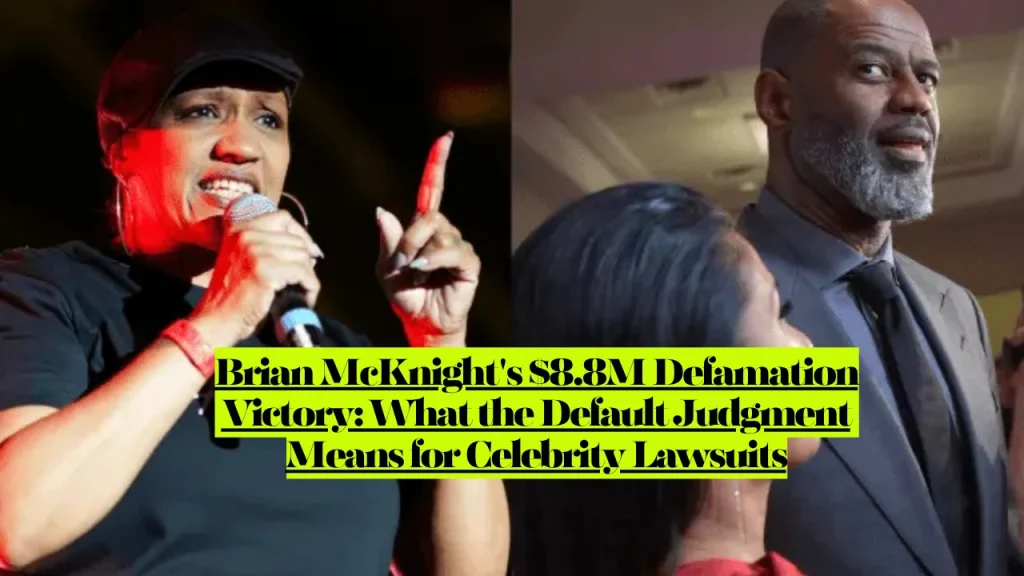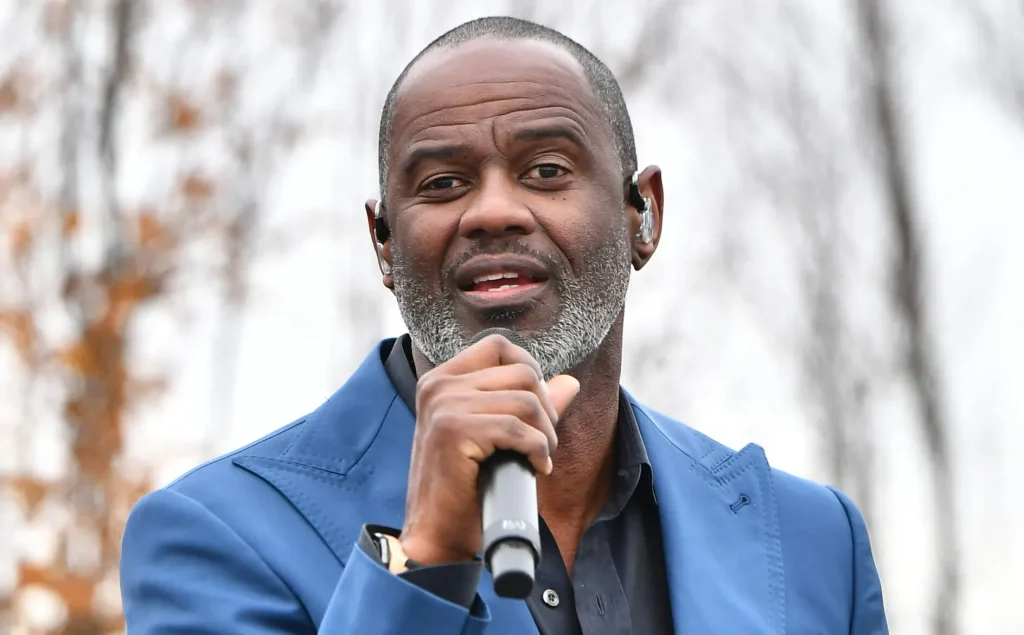Brian McKnight’s $8.8M Defamation Victory, What the Default Judgment Means for Celebrity Lawsuits
R&B legend Brian McKnight made headlines in October 2025 by announcing an $8.8 million defamation judgment against his ex-wife Julie McKnight. The case centers on allegations made in her book “Mama Bear: Beautifully Blended” and represents a significant default judgment that could impact how celebrity defamation cases are fought in court.
The Case at a Glance
McKnight filed the defamation lawsuit in May 2025, claiming his ex-wife made false statements about him in her published book. The legal action came after years of public family disputes and escalating tensions between the former couple.
Key Details:
- Plaintiff: Brian McKnight (Grammy-nominated R&B artist)
- Defendant: Julie McKnight (ex-wife, married 1990-2003)
- Claimed Amount: $8.8 million
- Basis: Defamation over statements in “Mama Bear: Beautifully Blended”
- Status: Default judgment filed, awaiting court confirmation
What Led to the Lawsuit?
The defamation case stems from Julie McKnight’s book published in early 2025. According to court documents, Brian accused his ex-wife of making “false statements” that damaged his reputation and career.
The book allegedly contained claims that McKnight was emotionally abusive and harassed Julie during their marriage. Additionally, it suggested he neglected their children’s well-being and was responsible for preventing both Julie and their children from achieving success in the music industry.
McKnight characterized these allegations as “a hoax to generate positive publicity” for Julie’s career and sought compensatory damages for harm to his professional reputation.
Related article: Baseball’s Biggest Star Shohei Ohtani Accused of “Abuse of Power” in $240M Real Estate Scheme—What Ohtani Allegedly Did Will Shock You

Understanding Default Judgment in Defamation Cases
Here’s where the legal process gets interesting. McKnight’s announced “victory” is actually a default judgment—a ruling made when one party fails to appear in court.
What Happened: Julie McKnight did not appear for the scheduled court hearing. When a defendant fails to show up or respond to a lawsuit, the plaintiff can file a motion for default judgment, asking the court to rule in their favor automatically.
Important Legal Distinction: While McKnight celebrated the $8.8 million figure, court records show the default judgment was granted at a hearing, but the specific monetary details haven’t been made publicly available yet. The court must still confirm the exact damages amount.
Why Default Judgments Matter in Celebrity Cases
Default judgments present unique dynamics in high-profile litigation:
Advantages for Plaintiffs:
- Avoids lengthy trial proceedings
- Reduces legal costs
- Eliminates need to prove case before jury
- Often results in faster resolution
Risks and Limitations:
- Judgment may be overturned if defendant provides valid reason for absence
- Collecting awarded damages can still be challenging
- Public perception may view it as “winning by technicality”
- Less precedent-setting value than jury verdict
The Legal Standard for Defamation
To win a defamation case, plaintiffs must typically prove four elements:
- False Statement: The statement must be factually incorrect
- Publication: Statement was communicated to third parties
- Fault: Defendant acted with negligence or actual malice
- Damages: Plaintiff suffered actual harm to reputation
For public figures like McKnight, the burden is even higher. He would need to prove “actual malice”—that Julie knew the statements were false or showed reckless disregard for the truth.
What Makes This Case Significant?
Several factors make the McKnight defamation case noteworthy in celebrity legal circles:
The $8.8 Million Figure: If confirmed, this represents a substantial defamation award. Most defamation settlements range from hundreds of thousands to low millions, making this potentially one of the larger recent celebrity defamation judgments.
Book Publications as Evidence: The case highlights legal risks authors face when writing about ex-spouses and family members. Unlike social media posts that might be deleted, published books create permanent evidence.
Celebrity Family Disputes: The lawsuit exemplifies how private family conflicts can escalate into major legal battles when parties have public platforms and reputations to protect.
Implications for Future Celebrity Defamation Cases
This case could influence how entertainment industry figures approach similar disputes:
Increased Litigation Risk: Authors and content creators may face more defamation suits when writing about public figures, particularly ex-partners.
Default Judgment Strategy: Plaintiffs may pursue default judgments more aggressively, knowing that defendants who fail to appear forfeit their defense.
Memoir Publishing Standards: Publishers might implement more rigorous fact-checking and legal review processes for memoirs involving public figures.

The Broader Context: McKnight Family Disputes
The defamation lawsuit sits within a complex web of family tensions that have played out publicly:
McKnight has been estranged from his older children for years, a rift that intensified after the death of his son Niko from cancer in May 2025. The timing of McKnight’s celebration—on what would have been Niko’s birthday—sparked additional controversy and criticism from his son Brian McKnight Jr.
These family dynamics underscore how defamation cases rarely exist in isolation. They’re often symptoms of deeper, long-standing conflicts that money judgments alone cannot resolve.
What Happens Next?
The legal process isn’t over yet. Here’s what typically follows a default judgment filing:
Court Confirmation: The judge must review and officially confirm the judgment amount. This isn’t automatic—courts scrutinize whether claimed damages are reasonable and supported by evidence.
Collection Process: Even after confirmation, McKnight would need to actually collect the $8.8 million. This can involve garnishing wages, placing liens on property, or negotiating payment plans.
Potential Appeal: Julie McKnight could potentially challenge the default judgment if she can demonstrate valid reasons for missing the court date, though this becomes more difficult as time passes.
Related Litigation: McKnight has indicated he plans to pursue legal action against others who “promoted these lies,” suggesting additional lawsuits may follow.
Expert Perspectives on the Case
Legal experts note that default judgments in defamation cases present unique challenges:
The absence of a trial means there’s no jury evaluation of credibility, no cross-examination of witnesses, and no opportunity for the defendant to present contradictory evidence. This can make the judgment appear less legitimate in the court of public opinion, even if legally valid.
Additionally, high-dollar defamation awards often get reduced on appeal or in post-judgment negotiations. The $8.8 million figure McKnight announced may not reflect the final amount actually paid.
Lessons for Public Figures
The McKnight case offers several takeaways for celebrities and public figures:
Document Everything: Maintain records of communications and events that might later be disputed. McKnight’s ability to cite specific passages from Julie’s book strengthened his legal position.
Respond to Lawsuits Promptly: Failing to appear in court, as Julie allegedly did, can result in automatically losing the case regardless of merit.
Consider Reputation vs. Publicity: Pursuing high-profile defamation cases keeps disputes in the public eye, which may not always serve the plaintiff’s interests despite potential monetary recovery.
Consult Legal Counsel Before Publishing: Anyone writing memoirs or making public statements about others should seek legal review to avoid defamation exposure.
FAQs About the Brian McKnight Defamation Case
Q: Has Brian McKnight officially won $8.8 million?
A: Not yet. McKnight filed for default judgment after Julie didn’t appear in court, but the court must still confirm the specific damages amount. While McKnight announced the $8.8 million figure, public court records haven’t confirmed this exact amount.
Q: What is a default judgment in a defamation case?
A: A default judgment occurs when the defendant fails to respond to a lawsuit or appear in court. The judge can then rule in the plaintiff’s favor without a trial. The plaintiff still must prove damages are reasonable.
Q: Can Julie McKnight appeal or challenge the default judgment?
A: Potentially, yes. She could file a motion to set aside the default judgment if she can show good cause for missing the court date, though this becomes harder as time passes. She could also appeal after the final judgment is entered.
Q: What did Julie McKnight’s book say about Brian?
A: According to court documents, the book “Mama Bear: Beautifully Blended” allegedly claimed Brian was emotionally abusive, harassed Julie during their marriage, and neglected their children’s well-being. Brian categorically denies these allegations.
Q: Is $8.8 million a typical defamation award?
A: No, it’s quite high. Most defamation settlements range from hundreds of thousands to a few million dollars. If confirmed, this would be one of the larger recent celebrity defamation judgments, though some high-profile cases have resulted in even larger awards.
Q: What evidence did Brian McKnight present?
A: Since this is a default judgment (meaning no trial occurred), we don’t have public records of evidence presented. However, court filings cite specific passages from Julie’s published book as the basis for the defamation claims.
Q: Will Brian McKnight actually collect $8.8 million?
A: That remains uncertain. Even after a judgment is confirmed, collecting can be challenging. It depends on Julie’s assets and income. Many high-dollar judgments are later negotiated down or go uncollected.
Conclusion
The Brian McKnight defamation case represents a significant moment in celebrity legal battles, particularly regarding how family disputes and memoir publications intersect with defamation law. While McKnight’s announcement of an $8.8 million victory garnered headlines, the legal reality is more complex—this is a default judgment still awaiting final court confirmation.
The case underscores critical lessons about the risks of publishing allegations about public figures, the strategic value of default judgments, and the limitations of legal victories in resolving deep family conflicts. As the legal process continues, this case will likely influence how celebrities, authors, and publishers approach similar disputes in the future.
For those navigating comparable situations, this case reinforces the importance of legal counsel before making public statements or publishing material about others, responding promptly to legal actions, and understanding that courtroom victories don’t always translate to real-world resolution or public vindication.
Legal Disclaimer: This article is for informational and educational purposes only and does not constitute legal advice. The information presented is based on publicly available sources and news reports. For specific legal guidance regarding defamation cases or related matters, please consult with a qualified attorney licensed in your jurisdiction. Laws vary by state and individual circumstances significantly impact legal outcomes.
About the Author

Sarah Klein, JD, is a licensed attorney and legal content strategist with over 12 years of experience across civil, criminal, family, and regulatory law. At All About Lawyer, she covers a wide range of legal topics — from high-profile lawsuits and courtroom stories to state traffic laws and everyday legal questions — all with a focus on accuracy, clarity, and public understanding.
Her writing blends real legal insight with plain-English explanations, helping readers stay informed and legally aware.
Read more about Sarah
